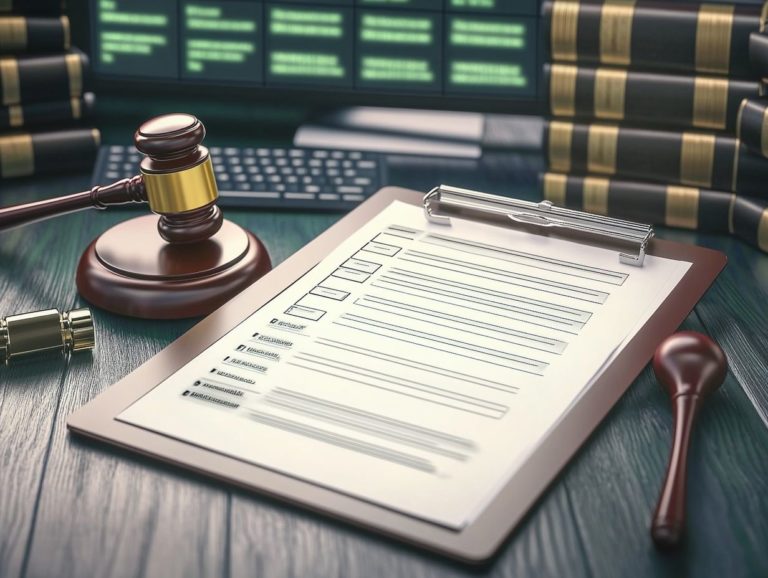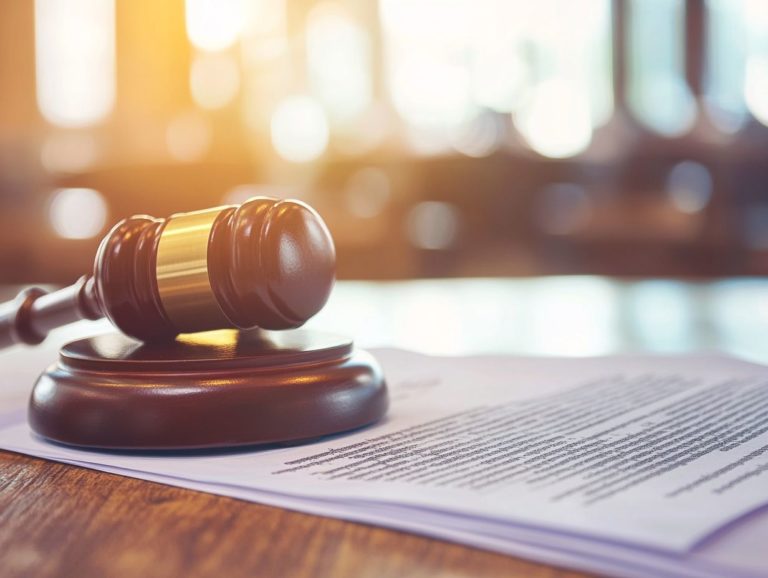5 Most Influential Books on IP Litigation
Intellectual property (IP) litigation represents a pivotal realm of law that defines how businesses protect their innovations and creative endeavors.
In this exploration, you ll discover five influential books that delve into the details of IP litigation, offering strategic insights and practical guidance. Whether you re an attorney, a business owner, or simply intrigued by the subject, these resources will equip you with the knowledge necessary to navigate the complex landscape of IP disputes and effectively protect your intellectual assets.
Contents
- Key Takeaways:
- 1. Patent Litigation and Strategy
- 2. Intellectual Property Litigation: Pretrial Practice
- 3. IP Litigation Best Practices: Leading Lawyers on Protecting and Defending Your Company’s Intellectual Property
- 4. The Patent Litigator’s Job: A Survival Guide
- 5. The Copyright Litigation Handbook
- What Is IP Litigation and Why Is It Important?
- What Are the Key Elements of a Successful IP Litigation Strategy?
- What Are the Common Challenges in IP Litigation?
- How Can a Business Protect Their Intellectual Property?
- What Are the Different Types of IP Litigation?
- What Are the Key Differences Between IP Litigation in Different Countries?
- How Can a Business Prepare for IP Litigation?
- What Are the Possible Outcomes of IP Litigation?
- How Can a Business Recover from a Loss in IP Litigation?
- What Are the Latest Trends and Developments in IP Litigation?
- How Can a Business Avoid IP Litigation?
- What Are the Ethical Considerations in IP Litigation?
- What Are the Key Skills and Qualities of a Successful IP Litigator?
- What Are the Potential Impacts of IP Litigation on a Business?
- What Are the Future Prospects for IP Litigation?
- Frequently Asked Questions
- What are the 5 most influential books on IP litigation?
- Why are these books considered influential in the field of IP litigation?
- Do these books cover all types of intellectual property?
- Are these books suitable for both beginners and experienced practitioners?
- Can these books be used as reference materials for academic or professional purposes?
- Do these books offer practical tips and techniques for handling IP litigation cases?
Key Takeaways:

- Understand best practices from leading lawyers.
- Prioritize evidence collection and legal expertise.
- Prepare for challenges like high costs and lengthy processes.
1. Patent Litigation and Strategy
Patent litigation is a crucial component of intellectual property law. It involves strategies that can significantly impact the success of your business and its innovations.
In today s competitive landscape, protecting your rights is essential. Defending against infringement can safeguard the fruits of years of research and development.
In states like Florida and New Jersey, patent laws incentivize innovation, allowing you to pursue legal avenues that shield your inventions.
A strategic approach to litigation is vital. This often involves meticulous documentation, expert testimony, and a deep understanding of the US Patent and Trademark Office’s guidelines.
Notable authors have highlighted the necessity of thorough preparation and aligning your business objectives with legal strategies.
Navigating these challenges means you can protect your ideas and maintain a competitive edge while nurturing a culture of innovation within your organization.
2. Intellectual Property Litigation: Pretrial Practice
Intellectual property litigation begins well before you step into the courtroom. Pretrial practice is crucial in determining the outcome of your case.
The American Bar Association underscores the importance of effective pretrial strategies. These strategies aid you in gathering essential evidence, crafting legal theories, and ultimately protecting your copyright laws and intellectual property rights.
Given the complexities of both federal and state regulations, understanding pretrial proceedings is vital. During this crucial phase, discovery a process where both sides gather information from each other plays a key role, allowing you to meticulously build your case.
Motions, such as those to compel or dismiss, further shape the litigation’s direction by addressing procedural issues efficiently. This ensures that your case remains focused and streamlined.
Settlement negotiations can arise early in the process, providing you and the opposing party a chance to resolve disputes amicably. This is often a more cost-effective and time-efficient alternative to going to trial.
The interplay of these components not only defines the legal landscape of your IP case but also highlights the importance of adhering to established best practices as outlined by the ABA.
3. IP Litigation Best Practices: Leading Lawyers on Protecting and Defending Your Company’s Intellectual Property
In the realm of IP litigation, embracing best practices is vital for protecting and defending your company’s creative ideas and inventions, including trade secrets and trademarks. Top attorneys assert that a proactive approach, informed by understanding IP litigation and the latest developments in IP law, is essential for navigating today’s business challenges.
This involves grasping the nuances of trademark law and recognizing the importance of safeguarding confidential information. Experts recommend conducting comprehensive risk assessments to pinpoint potential vulnerabilities that might lead to infringement disputes.
By crafting a robust litigation strategy, you can significantly mitigate risks and enhance the likelihood of a favorable outcome. It’s important for your company not just to register trademarks but also to actively monitor their use in the marketplace to prevent unauthorized exploitation.
Training your employees about the significance of trade secrets is crucial for maintaining competitive advantages. This training helps ensure compliance with copyright laws and reinforces your commitment to protecting valuable assets.
Ultimately, a well-rounded approach to intellectual property can fortify your company s position and resilience in the face of legal challenges.
4. The Patent Litigator’s Job: A Survival Guide
The role of a patent litigator presents a unique blend of challenges and rewards. It demands a profound grasp of the intellectual property landscape and the nuances of litigation.
In his comprehensive survival guide, James G. McEwen outlines the essential skills and attributes you must cultivate to thrive in this arena, from analytical thinking to masterful negotiation. Continuous education is vital for success in this field.
You must stay updated on current regulations while keeping an eye on future changes that could impact your strategies. The guide underscores the necessity of nurturing a flexible mindset, enabling you to adjust tactics as new legal precedents emerge.
As the intellectual property culture evolves, it shapes litigation practices, creating an environment where innovative thinking and proactive measures are paramount. To navigate this landscape effectively, be aware of the pitfalls in IP litigation to avoid, as your ability to intertwine legal expertise with an awareness of industry trends will enhance your effectiveness in resolving intricate disputes.
5. The Copyright Litigation Handbook
This handbook is your key to mastering copyright litigation, particularly amidst varying state laws like those in Florida and New Jersey. This guide unlocks the complexities of copyright law, making it easier for you to protect your rights.
As copyright litigation continues to evolve, your awareness of local laws becomes essential for effective representation. By examining case studies from diverse jurisdictions, you can see how seemingly minor differences in the law can lead to substantial implications in actual lawsuits.
For example, a landmark case in New Jersey underscored the necessity of strong evidence to support claims of infringement. Florida courts, on the other hand, took a more lenient stance on fair use defenses.
These examples clarify the practical implications of copyright statutes and arm you with the knowledge needed to navigate these legal landscapes with confidence. Ultimately, this handbook fosters a deeper understanding of the nuanced realities of copyright enforcement for both legal professionals and creators.
What Is IP Litigation and Why Is It Important?
IP litigation involves the legal processes essential for enforcing and defending intellectual property rights. It is a key element for businesses like yours in today’s competitive landscape.
Grasping the nuances of IP litigation, including the different laws in Florida and New Jersey, is crucial. This understanding helps you navigate challenges related to trade secrets, patents, and copyrights.
The significance of IP litigation is immense. It directly influences innovations, market position, and your overall business sustainability, making the 5 tips for IP litigation success crucial to consider.
The stakes are particularly high for both startups and established firms. The outcomes of these lawsuits can lead to major financial wins or losses, as well as impact the future trajectory of your products and branding.
Consider notable cases like the Apple vs. Samsung patent battle, which showcases how fiercely companies protect their innovations and market share.
State laws play a pivotal role in shaping litigation strategies and outcomes. Jurisdiction often dictates the governing legal principles and procedural landscapes. Firms that thoroughly understand these variations are in a stronger position to safeguard their intellectual property and effectively pursue or defend against infringement claims.
What Are the Key Elements of a Successful IP Litigation Strategy?

A successful IP litigation strategy relies on several key elements essential for safeguarding your intellectual property rights and ensuring favorable outcomes. These components include thorough research, meticulous documentation, and a deep understanding of the legal landscape surrounding intellectual property.
By effectively addressing these elements, you can confidently navigate the complexities of IP litigation, as highlighted in 5 notable international IP cases to know.
Incorporating thorough research establishes a solid foundation for your claims. The eBay vs. MercExchange case exemplifies this, as extensive prior art studies were pivotal in shaping the arguments.
Proper documentation, including contracts and registration details, serves as crucial evidence. The Coca-Cola Company s success in defending its trade secrets is a prime example.
A deep understanding of evolving IP laws equips you to anticipate challenges and leverage precedents effectively. The transformative rulings in the Apple vs. Samsung case demonstrate this capability.
By weaving these elements into a cohesive strategy, you can enhance your litigation posture and significantly increase your chances of achieving favorable resolutions.
What Are the Common Challenges in IP Litigation?
IP litigation poses a series of common challenges that you must navigate to effectively safeguard your clients’ intellectual property. From the complexities of the legal landscape to the nuances of patent and copyright laws, these hurdles demand a strong legal foundation and innovative strategies for resolution.
You must understand these challenges to thrive in IP litigation. The multifaceted nature of these challenges often requires maneuvering through convoluted legal frameworks and varying jurisdictions, making it difficult to achieve favorable outcomes.
Enforcement issues add another layer of complexity. Obtaining a judgment is merely the beginning; translating that into actionable results can be a monumental task.
The financial strain of prolonged litigation can burden even strong budgets. Experts recommend prioritizing early case assessments and leveraging alternative dispute resolution methods as effective strategies to alleviate these challenges.
By staying informed about legal trends and employing proactive risk management strategies, you can significantly enhance your chances of success in IP disputes.
Ready to take action? Review your IP strategies today and consult with a legal expert to ensure your intellectual property is well-protected.
How Can a Business Protect Their Intellectual Property?
Protecting intellectual property (IP) refers to creations of the mind, like inventions, designs, and brand names. It is crucial for businesses like yours that aim to maintain a competitive edge, and it demands a carefully crafted strategy.
Effective measures include safeguarding trade secrets, applying for patents, and registering trademarks. These steps ensure your innovations and brand identities are legally shielded from infringement.
By proactively addressing these facets, you can strengthen your IP rights against potential threats. Incorporating a comprehensive IP policy can enhance your protective framework, enabling your teams to grasp the significance of confidentiality agreements and the secure handling of sensitive information.
Train your employees and conduct audits to respect and value intellectual property. Consider the case studies of successful tech firms; they illustrate how a robust commitment to IP protection has resulted in increased market share and brand loyalty.
Act now! Monitor for potential infringements and adapt your strategies to protect your innovations effectively.
What Are the Different Types of IP Litigation?
There are several distinct types of IP litigation, each addressing specific legal issues tied to intellectual property rights, including copyright, trademark, and patent disputes. Understanding the differences between these types of litigation is crucial, as each one presents unique challenges and implications for protecting your assets.
This differentiation allows you to devise targeted strategies tailored to specific legal scenarios.
Take copyright litigation, for example. It typically involves unauthorized use of creative works like music, films, or literature. A notable case that underscores this complexity is ‘Burlington Industries, Inc. v. E. I. Du Pont De Nemours & Co.,’ which brought to light the intricacies surrounding derivative works. Understanding these nuances is essential for effective protection.
Then there are trademark disputes, which often revolve around brand identity. A prime example is ‘Starbucks Corporation v. Wolfe’s Borough Coffee, Inc.,’ where brand recognition was pivotal.
On the other hand, patent litigation frequently addresses innovations and inventions. The case of ‘Eldred v. Ashcroft’ illuminates the nuances of patent protection duration.
Navigating each of these categories requires specific legal strategies, including thorough documentation and expert testimonies, to effectively tackle the challenges they present.
What Are the Key Differences Between IP Litigation in Different Countries?
The key differences in IP litigation across various countries can profoundly influence how you approach the protection of your intellectual property. Factors like national laws, international agreements, and cultural perspectives on IP rights create a complex landscape that you need to navigate carefully.
Understanding these variations is essential for any business operating in the global marketplace. Adapting your strategies to fit each unique legal environment is crucial.
For instance, some nations may emphasize innovation and creativity, resulting in stronger protections for IP rights, while others might adopt a more lenient stance, viewing intellectual property as a communal asset.
International treaties like the Agreement on Trade-Related Aspects of Intellectual Property Rights (TRIPS) provide frameworks that align certain standards but still leave room for local interpretations. This divergence can lead to significant implications for enforcement, compliance, and overall business risk.
Consequently, conduct detailed legal assessments tailored to each jurisdiction.
How Can a Business Prepare for IP Litigation?
Preparing for IP litigation requires a clear business plan that addresses potential vulnerabilities and outlines proactive measures to safeguard your rights over the creations of your mind, like inventions or designs. This preparation includes conducting thorough risk assessments, maintaining meticulous documentation, and fostering a culture of IP awareness throughout your organization. Such strategic foresight can significantly influence the outcome of any litigation process.
To lay a solid foundation, invest in employee training focused on recognizing and protecting intellectual property. Regular IP audits help pinpoint weaknesses and ensure compliance with relevant laws. Successful companies often create clear policies that outline how employees should manage proprietary information and innovations.
Establish a rapid response team to handle potential infringements. This will enhance your organization s readiness for legal challenges. By integrating these steps into your corporate culture, you can effectively defend your IP and improve your overall operational integrity.
What Are the Possible Outcomes of IP Litigation?
The outcomes of IP litigation can vary widely, presenting a range of legal consequences that could greatly impact your business. You might face favorable judgments, settlements, or, conversely, unfavorable rulings that could lead to injunctions or damages for copyright infringement.
Understanding these potential outcomes is crucial for navigating the litigation landscape. A favorable judgment not only validates your intellectual property rights but can also deter future infringements and enhance your market position.
Opting for a settlement can provide quicker resolution, allowing you to avoid the uncertainties of a trial while minimizing risks for both parties. However, losing a case might result in severe repercussions, including substantial financial penalties or the mandatory cessation of specific business practices.
By analyzing these diverse potential outcomes, you can make informed choices, weighing the benefits and drawbacks of pursuing or defending against IP claims.
How Can a Business Recover from a Loss in IP Litigation?

Recovering from a loss in IP litigation can be challenging for your business and requires a strategic approach to mitigate damages and restore your reputation. Effective recovery strategies may involve reassessing your IP protections, refining your legal tactics, and enhancing public relations efforts to rebuild trust with stakeholders.
Prioritizing robust operational assessments will help identify vulnerabilities and enhance internal procedures. Investing in legal counsel is essential to strengthen future protections and ensure compliance with evolving laws, shielding your organization from potential pitfalls.
A proactive marketing strategy that emphasizes transparency, while showcasing your commitment to innovation, can help regain lost customers and attract new ones. In this landscape, reputation management is critical; a positive public image can serve as a powerful asset in overcoming litigation setbacks and fostering long-term success.
What Are the Latest Trends and Developments in IP Litigation?
Staying informed about the latest trends and developments in IP litigation is vital for safeguarding your intellectual property rights. Recent advancements, such as patent reform and shifts in enforcement strategies, highlight the dynamic nature of IP law.
Understanding these trends allows you to adjust your legal strategies and maintain a competitive edge. For instance, the rise of artificial intelligence and digital content has led to significant legislative updates affecting copyright enforcement and patent eligibility criteria.
As you navigate these changes, use data analytics to inform your litigation strategies and anticipate challenges before they arise. By monitoring how courts interpret emerging technologies and observing competitors’ tactics, you can protect your assets and seize new opportunities.
This proactive approach ensures you remain resilient in an ever-evolving landscape.
How Can a Business Avoid IP Litigation?
Avoiding IP litigation requires you to adopt proactive strategies that protect your intellectual property rights. Strong policies and regular checks on your intellectual property can minimize the risk of infringement.
By prioritizing these measures, you will greatly reduce the chances of costly legal disputes. Ensuring your employees are well-trained in identifying and handling intellectual property acts as your first line of defense against potential violations.
Maintaining thorough documentation of innovations and existing rights further strengthens your position.
Regular IP audits help uncover vulnerabilities and reinforce the importance of intellectual property within your organizational culture. By instilling a strong sense of IP awareness throughout your teams, you create an environment where innovation flourishes alongside respect for legal boundaries, minimizing the chances of disputes.
What Are the Ethical Considerations in IP Litigation?
Ethical considerations are vital in IP litigation. They shape the behavior of attorneys and the strategies they employ throughout the legal process. Legal ethics require you, as a professional involved in IP cases, to uphold integrity, avoid conflicts of interest, and ensure fair representation of intellectual property rights.
Understanding these principles fosters trust in the legal system. As an attorney, you must navigate a landscape filled with potential ethical dilemmas, often balancing vigorous representation and unethical practices.
Consider the case of In re: The Estate of Williams, which highlighted the ethical challenges attorneys encounter when their clients’ interests clash with their own financial incentives. This underscores the need for you to remain vigilant, adhere to ethical guidelines, and reflect on your responsibilities.
Examining various case studies shows that professional conduct in IP litigation impacts individual cases and shapes the broader perception of the legal profession.
What Are the Key Skills and Qualities of a Successful IP Litigator?
The key skills and qualities of a successful IP litigator blend legal expertise, strategic thinking, and effective communication. You need a solid understanding of intellectual property laws, sharp analytical skills, and the finesse to navigate complex legal landscapes.
These attributes are crucial for crafting effective litigation strategies and securing favorable outcomes for your clients. Your negotiation skills will be vital in reaching settlements that align with your client s goals, saving both time and resources.
Analytical thinking enables you to examine precedents and evidence meticulously. This allows you to construct compelling arguments that resonate in the courtroom. Communication is essential not just for explaining complex legal concepts to clients, but also for persuading judges and juries.
These skills can be developed through training programs, mentoring opportunities, and practical experience in various legal settings, ensuring you are well-prepared to excel in the competitive realm of intellectual property law.
What Are the Potential Impacts of IP Litigation on a Business?
The potential impacts of IP litigation on your business can be profound. They affect your financial stability, brand reputation, and market positioning. Legal issues from IP disputes can lead to significant costs and operational disruptions.
Such litigation can drain resources, diverting your focus from core operations and innovation as you address legal hurdles. For instance, a well-known technology firm caught in a patent infringement lawsuit faced a costly settlement and delays in launching a competitive product, impacting its market edge.
Public perception can also suffer when your business becomes embroiled in these disputes. Consumers may question your integrity or commitment to innovation. Therefore, it s imperative to stay vigilant in protecting your intellectual property while considering the ramifications of litigation on your overall market strategy.
What Are the Future Prospects for IP Litigation?
The future of IP litigation is shaped by trends in technology, law, and global commerce, creating a vibrant legal landscape for you to navigate. To enhance your skills in this area, consider exploring resources for IP litigation training.
As intellectual property rights gain significance in the digital age, staying ahead of challenges is crucial. To effectively navigate this landscape, familiarize yourself with the 5 must-know terms in IP litigation and adapt your strategies to meet new technologies and legal interpretations.
In our connected world, cross-border disputes and different legal frameworks complicate IP enforcement. Be prepared for these challenges!
Advancements in artificial intelligence and blockchain technology will revolutionize how intellectual property is created and shared. Embrace innovation and invest in strong compliance programs to protect your IP assets.
By anticipating these changes, you can mitigate risks and seize valuable opportunities. Fostering a culture of agility in your organization is key to thriving in the global market.
Frequently Asked Questions

What are the 5 most influential books on IP litigation?
The top five influential books are:
- “Patent Litigation Strategies Handbook” by Gregory J. Battersby and Charles W. Grimes
- “Essentials of Intellectual Property” by Alexander I. Poltorak and Paul J. Lerner
- “Fundamentals of Intellectual Property Valuation” by Weston Anson and Donna Suchy
- “The Comprehensive Guide to Intellectual Property Law” by Peter C. Schechter and R. Mark Halligan
- “Intellectual Property Litigation: Pretrial Practice” by Roland Miller.
Why are these books considered influential in the field of IP litigation?
These books stand out for their practical insights into IP litigation. They cover strategies, valuation, and pretrial practice, making them valuable for all levels of experience, especially when considering recent trends in IP litigation.
Do these books cover all types of intellectual property?
Yes, they address patents, trademarks, copyrights, and trade secrets. This gives readers a well-rounded understanding of IP litigation.
Are these books suitable for both beginners and experienced practitioners?
Absolutely! They provide an overview for beginners and advanced insights for seasoned professionals.
Can these books be used as reference materials for academic or professional purposes?
Yes, they are well-researched and contain in-depth analyses. They are perfect for students and professionals in IP litigation.
Do these books offer practical tips and techniques for handling IP litigation cases?
Yes, they include real-world examples and techniques. This helps readers apply the concepts effectively.






